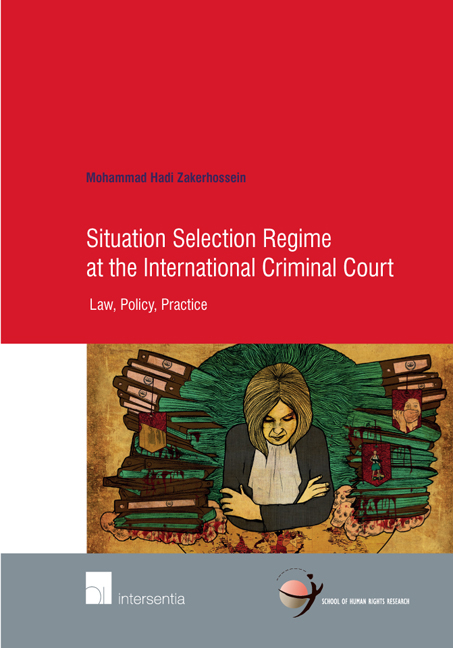Book contents
- Frontmatter
- Contents
- Acknowledgment
- Abbreviations
- General Introduction
- Part One Formulating the Concept of Situation in the Rome Statute Sense
- Part two Situation Selection Process
- Chapter I Trigger Mechanism
- Chapter II Identification Stage
- Chapter III Preliminary Examination
- Chapter IV Making a Decision on the Situation Selection
- Part three Situation Selection Criteria
- Part Four Situation Selection In Light Of Expressivism
- Conclusion
- Bibliography
- ICC Case Tables
- OTP Documents
- About the Author
- School of Human Rights Research Series
Chapter III - Preliminary Examination
from Part two - Situation Selection Process
Published online by Cambridge University Press: 13 October 2018
- Frontmatter
- Contents
- Acknowledgment
- Abbreviations
- General Introduction
- Part One Formulating the Concept of Situation in the Rome Statute Sense
- Part two Situation Selection Process
- Chapter I Trigger Mechanism
- Chapter II Identification Stage
- Chapter III Preliminary Examination
- Chapter IV Making a Decision on the Situation Selection
- Part three Situation Selection Criteria
- Part Four Situation Selection In Light Of Expressivism
- Conclusion
- Bibliography
- ICC Case Tables
- OTP Documents
- About the Author
- School of Human Rights Research Series
Summary
Preliminary examination constitutes the first step in the core activities of the OTP. In the identification phase, the Prosecutor distinguishes a situation from non-situations. In the current stage, the Prosecutor shall select a situation for investigation among those situations that have already been identified and brought to her attention. The situation selection is made through the preliminary examination. By operating the preliminary examination, the Prosecutor seeks to make a determination whether or not there is a reasonable basis to initiate an investigation. In the preliminary examination, it is determined whether the given situation meets the legal criteria established by the Rome Statute to warrant an investigation. The examination is preliminary because the Prosecutor's decision could be subject to change if the relevant circumstances adjust in later stages. In other words, the findings of the Prosecutor in the preliminary examination are preliminary in nature, and are not “binding for future admissibility assessment.” In spite of its preliminary nature, this stage is a prominent structure at the ICC's architecture that helps to realize the Court's expressive functions. The establishment of the preliminary examination has arisen from the specific needs and features of the ICC.
The ICC has a unique and distinct feature in comparison with other international criminal tribunals, namely, its permanency. The permanency of the Court makes it a future-oriented organization with open mandates. It means that there are not predefined situations for conducting an investigation ahead of the ICC. It is the Court in itself that ultimately determines when and where to intervene. The Court's jurisdiction may be activated over all territories and nationals of its States Parties, if they are involved at ICC crimes. The founders of the Court did not limit the jurisdiction of this judicial institution to one or more specific crises. On the contrary, they authorized the Court to deal with all situations of crisis under its jurisdiction. Nonetheless, because the Court lacks sufficient resources to address all situations and cases falling within its jurisdiction, and as a result of its complementary role in combating international crimes, the Court needs to select a small number of situations and cases. The Court functions selectively.
- Type
- Chapter
- Information
- Situation Selection Regime at the International Criminal CourtLaw, Policy, Practice, pp. 111 - 130Publisher: IntersentiaPrint publication year: 2017



